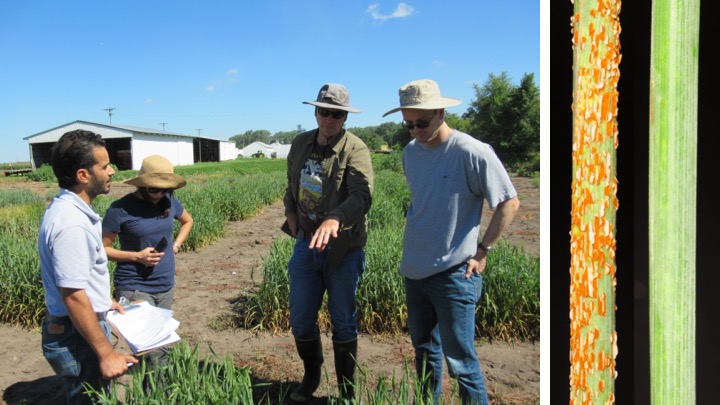Evanston, Illinois, USA
March 12, 2019
Working with collaborators at the Commonwealth Scientific and Industrial Research Organisation (CSIRO) and the University of Minnesota (UMN), 2Blades has demonstrated strong field resistance to stem rust disease in wheat containing a stack of five resistance genes.
Wheat stem rust is one of the world’s most devastating plant diseases and is best controlled through the use of resistant varieties. The stem rust resistance of wheats grown widely today was achieved by conventional breeding dating back to the Green Revolution of the 1960s. However, recently evolved strains of the stem rust pathogen can attack these wheats and threaten harvests again. Since 2008, 2Blades has led an international wheat rust consortium with the aim of fighting wheat stem and stripe rusts by sourcing and combining resistance genes from wheat and its relatives.
Dr. Mick Ayliffe’s group at CSIRO in Australia has developed wheat lines carrying a ‘cassette’ of five or more individual genes for stem rust resistance. Some of these lines were tested in the field for the first time this past summer by Prof. Brian Steffenson at UMN and showed very strong resistance to stem rust. This result is especially significant because the combination of multiple independent resistance genes greatly reduces the chance of the pathogen evolving to overcome resistance.

Left: Drs. Oadi Matny, Melania Figueroa, (Prof.) Brian Steffenson, and Peter Dodds discussing the wheat trial.
Right: The stem rust susceptible wheat variety Fielder (left) in comparison to a derived Fielder line (right) with a five-gene stack of resistance genes.
“In my 30 years of conducting stem rust experiments in the field, I have never seen a clearer demonstration of the effectiveness of host resistance against this devastating disease - conferred in this case by a five-gene cassette of resistance genes transferred by genetic engineering”, said Prof. Brian Steffenson, at the University of Minnesota.
Prof. Steve Swain, a Research Director at CSIRO, said “This is an exciting development toward producing crops with durable resistance to disease, which will contribute to sustainable food production and world food security.”
Further experiments will assess the resistance of these lines against a diverse collection of pathogen strains, and possible effects of resistance gene cassettes on plant growth and vigor. 2Blades and collaborators are also working to develop additional wheat lines with new resistance combinations and to mount field trials in Sub-Saharan Africa and elsewhere.
About 2Blades
The 2Blades Foundation, based in Evanston, Illinois, is a 501(c)(3) charitable organization dedicated to the discovery, advancement, and delivery of durable disease resistance in crops. 2Blades establishes and manages development programs addressing significant unsolved crop disease problems in collaboration with leading research institutions around the world and at the 2Blades Group in The Sainsbury Laboratory, Norwich, UK. 2Blades manages a portfolio of specific traits and enabling technologies that it implements in its own programs and out-licenses for broad use. Visit the 2Blades website at http://www.2blades.org and follow 2Blades on twitter at @2blades.
About CSIRO
As Australia’s national science agency, the Commonwealth Science and Industrial Research Organisation (CSIRO) pushes the boundaries of what is possible in innovation, science and technology. CSIRO delivers impact nationally and globally through collaboration with industry, governments and communities. CSIRO Agriculture and Food takes an integrated ‘gene to plate’ approach to improve crop quality and yield, develop innovative food processing technologies, create new value-added foods, and grow our livestock, aquaculture and fishery industries.
About UMN/CFANS
The University of Minnesota College of Food, Agricultural and Natural Resource Sciences (CFANS) brings science-driven innovators together to discover hands-on solutions to global challenges. With 10 research and outreach centers across Minnesota, the Minnesota Landscape Arboretum, and the Bell Museum of Natural History, CFANS offer unparalleled experiential learning opportunities for students and the community. CFANS students enter career fields with some of the best job outlooks in the country, including 13 undergraduate majors and more than 25 minors ranging from agricultural education and marketing communications to conservation biology and forest and natural resource management, health and nutrition, to the future of food and agriculture management with a focus on business and technology.